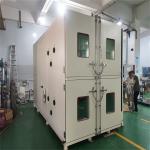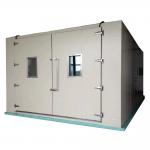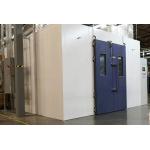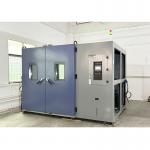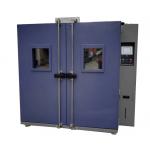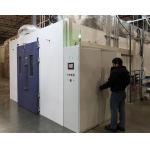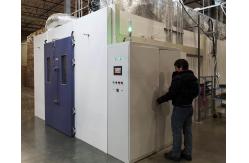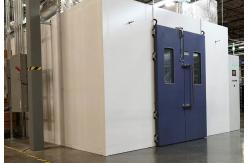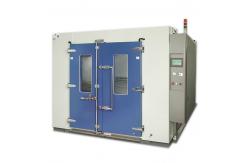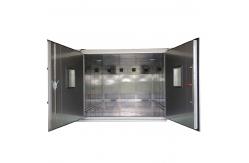In the highly demanding and mission-critical domain of military
applications, the reliability and durability of equipment are of
utmost significance. The Customization Temperature Humidity Test
Chamber, engineered to meet the MIL-STD-810 standard, emerges as a
vital asset for evaluating the performance of military hardware
under diverse and extreme temperature and humidity conditions. This specialized test chamber is designed to subject military
equipment, components, and systems to a comprehensive range of
temperature and humidity stressors. It serves military contractors,
defense research institutions, and quality assurance departments.
The core objective is to simulate the harsh environmental
conditions that military assets may encounter during their
operational lifespan, including deployment in various terrains and
climates, as well as during storage and transportation. By adhering
to the MIL-STD-810 standard, it ensures that the testing procedures
are consistent, reliable, and recognized within the military
community, enabling the development and deployment of equipment
that can withstand the rigors of real-world military operations. - Robust and Resilient Construction
- The test chamber is constructed with a heavy-duty framework,
typically fabricated from high-strength alloy steel, to endure the
intense forces and stresses associated with military testing. The
exterior is engineered to be highly durable and resistant to
corrosion, abrasion, and impact, ensuring its integrity even in the
most hostile environments. The interior is lined with a refractory
material that can withstand rapid and extreme temperature changes
without deteriorating or emitting harmful substances. The door of
the chamber is designed with a reliable sealing mechanism,
incorporating a high-quality gasket and a multi-point locking
system, which guarantees an airtight and secure enclosure. It also
features a viewing window made of toughened, heat-resistant glass,
allowing for visual inspection of the testing process while
maintaining the integrity of the test environment.
- Precision Temperature and Humidity Control Systems
- Temperature Control: Capable of maintaining a wide temperature
range, typically from -60°C to +120°C, with an exceptional accuracy
of ±0.3°C. It utilizes advanced refrigeration and heating
technologies, such as cascade refrigeration for ultra-low
temperature applications and high-power heating elements for rapid
temperature elevation. The control system incorporates a
sophisticated feedback loop, with multiple temperature sensors
strategically placed throughout the chamber, ensuring uniform
temperature distribution and minimal temperature gradients. The
user-friendly control panel allows for precise programming of
temperature profiles, including ramp rates, dwell times, and
cycling sequences, enabling the replication of complex real-world
temperature variations.
- Humidity Control: The humidity control system is equally precise,
capable of achieving humidity levels from 5% to 95% RH (Relative
Humidity), with an accuracy of ±2% RH. It employs a combination of
steam humidifiers and dehumidifiers, along with a carefully
designed air circulation system. The chamber is equipped with
humidity sensors that continuously monitor the internal humidity,
and the control system adjusts the humidification or
dehumidification processes accordingly. This allows for the
creation of stable and dynamic humidity environments, mimicking the
diverse moisture conditions that military equipment may face, such
as humid jungles, arid deserts, or high-altitude regions. The
system also includes a condensate removal mechanism to prevent any
water accumulation within the chamber, safeguarding the tested
samples and the chamber's internal components.
- Advanced Instrumentation and Data Acquisition
- The chamber is outfitted with a comprehensive suite of sensors and
instrumentation. Temperature and humidity sensors are supplemented
by pressure sensors to monitor any pressure changes that could
impact the test results or the performance of the samples.
Additionally, vibration sensors can be incorporated to assess the
combined effect of temperature, humidity, and vibration on the
equipment, which is crucial for simulating the conditions during
transportation or operation in a vibrating environment. These
sensors are connected to a state-of-the-art data acquisition system
that records and stores all the relevant data. The data acquisition
system offers a high sampling rate, typically ranging from 50 to
200 samples per second, ensuring that even the most rapid changes
in temperature, humidity, pressure, or vibration are accurately
captured. The collected data can be accessed and analyzed in
real-time or retrieved later for in-depth studies. The system is
also compatible with various data analysis software and can
generate detailed reports and graphs, facilitating the
interpretation and communication of test results.
- Compliance with MIL-STD-810 and Safety Features
- The Customization Temperature Humidity Test Chamber is designed and
manufactured to meet the specific requirements of MIL-STD-810,
which encompasses a wide range of environmental test methods
related to temperature and humidity. It incorporates multiple
safety features to protect both the operators and the testing
facility. It has an automatic emergency shutdown system that
activates in case of any critical malfunction or if the temperature
or humidity exceeds the safe operating limits. The chamber is also
equipped with a fire suppression system, which can quickly
extinguish any flames that may occur due to a sample failure or
electrical issue. Ventilation systems are in place to remove any
potentially harmful gases or fumes that could be generated during
the testing process. The control panel is designed with safety
interlocks and clear warning indicators to prevent accidental
operation and ensure the well-being of the personnel.
- Chamber Size and Capacity: Available in various sizes to accommodate different military
equipment and components. The volume can range from a few cubic
feet for testing small electronic modules or connectors to several
hundred cubic feet for larger assemblies like missile guidance
systems, radar equipment, or vehicle components. The interior
dimensions are optimized for proper air circulation and uniform
temperature and humidity distribution, ensuring that all parts of
the sample are effectively tested.
- Temperature Cycling Rate: Can perform temperature cycles at a rate of several cycles per
hour, depending on the specific requirements of the MIL-STD-810
test profile. For example, it can conduct 2 to 5 cycles per hour
between -40°C and +80°C, subjecting the sample to repeated and
rapid thermal stress, which is essential for evaluating the
equipment's resistance to thermal fatigue.
- Humidity Cycling Rate: The humidity can be cycled at a rate that allows for the
simulation of rapid changes in moisture conditions, such as
transitioning from a dry desert environment to a humid tropical
one. The chamber can adjust the humidity levels within a short
period, typically within 10 to 30 minutes, depending on the desired
test scenario.
- Data Acquisition Rate: The data acquisition system can sample sensor data at a rate of
100 to 500 samples per second. This high sampling rate ensures that
even the most minute and rapid changes in temperature, humidity,
pressure, or vibration during the test are accurately recorded and
can be analyzed in detail, providing valuable insights into the
equipment's performance and potential failure modes.
- MIL-STD-810 Standard Compliance: Complies with the relevant sections and procedures of
MIL-STD-810, ensuring that the testing is conducted in accordance
with the established military standards. This includes specific
temperature and humidity profiles, test durations, and sample
preparation methods, which are crucial for obtaining accurate and
comparable results.
- Accurate Simulation of Military Environmental Stress
- The primary function of this test chamber is to provide a highly
accurate and realistic simulation of the temperature and humidity
conditions that military equipment will face. By precisely
controlling the temperature and humidity transitions and
maintaining uniformity, it allows for the evaluation of how
products will perform and degrade over time. For example, it can
determine if a military-grade communication device will experience
signal interference or component failure due to condensation or
extreme temperature changes. It can also assess the integrity of
mechanical components, such as the seals and housings of military
weapons or the structural integrity of aircraft parts. This
information is crucial for military contractors to optimize their
product designs, select appropriate materials, and improve the
overall reliability and durability of their equipment.
- The ability to conduct repeatable tests in accordance with
MIL-STD-810 is also a valuable function. This helps in comparing
the performance of different product versions or batches and
identifying the most suitable design or manufacturing process. For
instance, a manufacturer can test multiple prototypes of a new
military vehicle's electronic control unit under the same
temperature and humidity cycling conditions and analyze the results
to determine which design offers the best resistance to
environmental stress.
- Enhanced Military Product Quality and Safety Assurance
|
